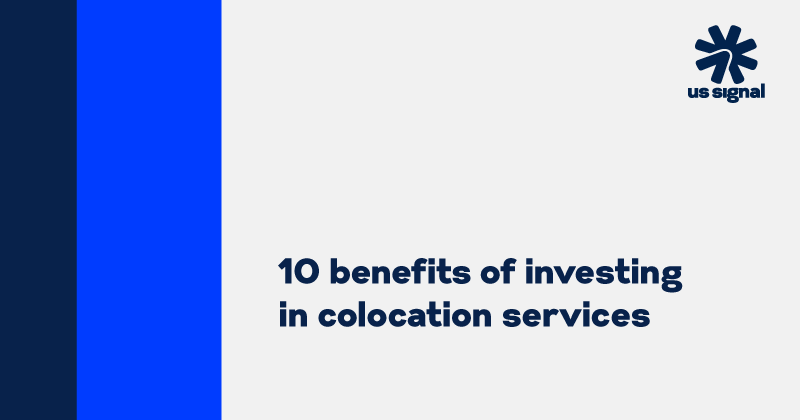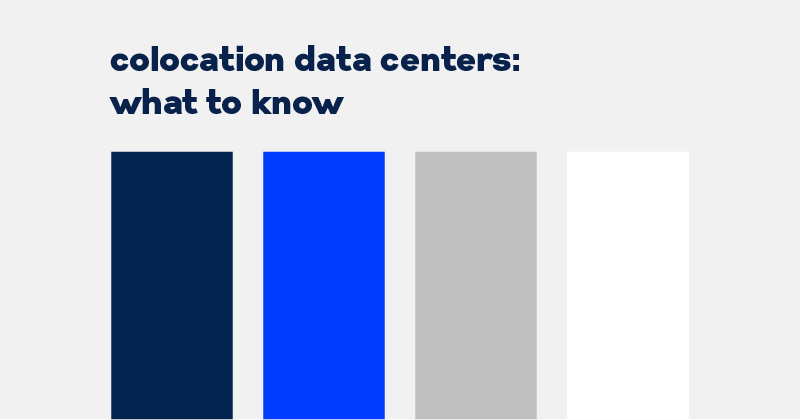10 Benefits of Investing in Colocation Services

Even though companies are flocking to the cloud, colocation remains a viable — even preferred — option for many companies. These 10 benefits of colocation help explain why.
10 Benefits of Colocation Services
Organizations are always looking for ways to cut unnecessary costs and optimize their resources and operations — all while providing the best services and/or products for their customers. One of the most beneficial tactics: colocation.
While there are advantages to on-site data centers, investing in and maintaining them can be expensive and resource-intensive. It’s also increasingly difficult for any but the largest and most sophisticated among them to meet the high demands for availability, security, performance, and efficiencies.
To appeal to and maintain customers, colocation data centers invest in the necessary technologies, equipment, high-level security, service offerings, and other components that help meet those demands. Their focus is on providing a viable alternative to on-site data centers; in doing so, they can offer numerous benefits.
The following are 10 of those benefits that help make a compelling argument for embracing colocation.
1. Cost Savings
By moving your IT infrastructure to a colocation facility, your organization no longer has to deal with the capital expenditures required for building, securing, and maintaining its own on-site data center.
It also doesn’t have to worry about the costs associated with supplying the power and cooling for an on-site data center, the physical security, or the routine facility maintenance and management.
2. Reliability
Colocation providers offer Service Level Agreements (SLAs) for uptime that most on-premises data centers struggle to match. That’s in large part due to the redundancies they offer, particularly in terms of power and cooling systems, to ensure uninterrupted service and lower the risk of business-disrupting outages.
Colocation facilities also employ around-the-clock monitoring using advanced systems to quickly detect and respond to any potential issues. Doing so further bolsters reliability and helps reduce the risk of downtime.
3. Security
Colocation data centers invest in high-level security at both the technological and physical levels to maintain customers- and customers’ trust. On the technology side, they increasingly employ stringent zero-trust cybersecurity protocols to deter, detect, and mitigate digital threats. This includes firewalls, intrusion detection systems, and secure access controls that guard against unauthorized digital access.
On the physical side, they use a multitude of safeguards, including surveillance systems, biometric access controls, and on-site security personnel, to provide a robust defense against intrusion and tampering.
4. Scalability
Unlike on-premises data centers, which can be limited by physical space and resources, most colocation facilities have the capacity to expand or contract to accommodate the changing needs of your business. This enables you to scale your IT infrastructure quickly and efficiently without incurring the substantial costs and time delays associated with in-house expansion.
Many colocation providers also offer seamless access to public and private cloud services, enabling you to take advantage of the inherent scalability of the cloud.
5. Performance
The best among colocation data centers are equipped with the latest in server, storage, and network technology, so you can leverage high-performance IT infrastructure without the responsibility and costs of your own in-house equipment upgrades. Regular maintenance and updates also help ensure optimal efficiency and performance.
6. Transition to the Cloud
Outsourcing selected workloads to a colocation facility can help you become comfortable in letting go of some of the day-to-day control of your IT assets — something you’ll be doing if you plan to move to the cloud. You maintain ownership of your IT assets but don’t have to invest in the facilities and manpower to keep them in-house. If the colocation facility you choose also supports cloud services, even better. It will help make transitioning to the cloud even easier and won’t require changing providers. (See #7 for a related benefit.)
7. Flexibility
Private cloud. Public cloud. On-site servers. Colocation. Colocation data centers support hybrid IT configurations, so you can combine any of these IT environments to best fit your organization’s specific needs and goals.
One of the issues with hybrid IT is that it requires advanced networking capabilities to move data between internal and external resources. Colocation providers that also offer cloud services typically have those capabilities in place. Because they enable you to put your non-cloud infrastructure in the same facility as your cloud systems, you take advantage of fast, reliable data movement between the two environments.
8. Compliance
Colocation providers regularly undergo audits to validate their compliance with standards such as SOC 2, HIPAA, and PCI DSS. Meeting the requirements requires them to implement rigorous security measures and processes including access controls, encryption protocols, incident response mechanisms, and regular vulnerability assessments. Your organization can take advantage of these already established frameworks, thus reducing the complexity of achieving and maintaining compliance in-house.
9. Free Up Internal Resources
Using colocation frees up valuable internal IT resources. Unburdened by routine tasks, your IT staff can focus on strategic initiatives, drive innovation, improve customer experiences, and better meet the needs of internal customers. The financial savings associated with colocation also free up capital for innovative technology or business expansion.
10. A More Environmentally Friendly Option
More companies than ever are going green. That includes data center operators ─ like US Signal ─ that provide cloud and colocation services, which can often be greener alternatives to on-premise data centers. Learn more in US Signal’s Go Green with the Cloud and Colocation eBook.
And There’s More
Colocation has many more potential benefits, depending on your organization’s needs, use cases, and future plans. Once you’ve determined that colocation is a good fit, the next step will be to select the right colocation provider.
For more information on colocation — including the when, where, and how, contact US Signal. You can also learn about our data centers here .



